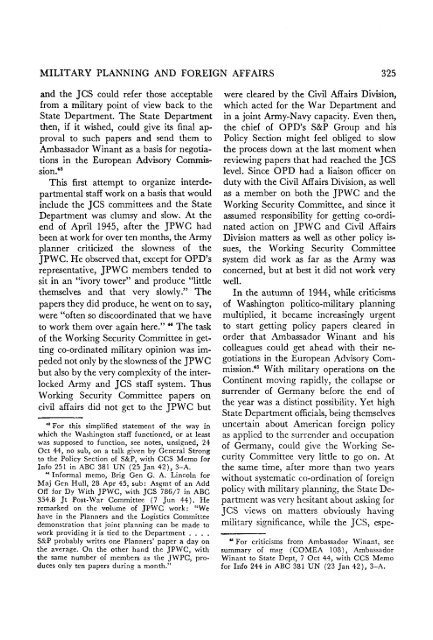To download as PDF click here - US Army Center Of Military History
To download as PDF click here - US Army Center Of Military History
To download as PDF click here - US Army Center Of Military History
You also want an ePaper? Increase the reach of your titles
YUMPU automatically turns print PDFs into web optimized ePapers that Google loves.
MILITARY PLANNING AND FOREIGN AFFAIRS 325<br />
and the JCS could refer those acceptable<br />
from a military point of view back to the<br />
State Department. The State Department<br />
then, if it wished, could give its final approval<br />
to such papers and send them to<br />
Amb<strong>as</strong>sador Winant <strong>as</strong> a b<strong>as</strong>is for negotiations<br />
in the European Advisory Commission.<br />
43<br />
This first attempt to organize interdepartmental<br />
staff work on a b<strong>as</strong>is that would<br />
include the JCS committees and the State<br />
Department w<strong>as</strong> clumsy and slow. At the<br />
end of April 1945, after the JPWC had<br />
been at work for over ten months, the <strong>Army</strong><br />
planner criticized the slowness of the<br />
JPWC. He observed that, except for OPD's<br />
representative, JPWC members tended to<br />
sit in an "ivory tower" and produce "little<br />
themselves and that very slowly." The<br />
papers they did produce, he went on to say,<br />
were "often so discoordinated that we have<br />
to work them over again <strong>here</strong>." 44 The t<strong>as</strong>k<br />
of the Working Security Committee in getting<br />
co-ordinated military opinion w<strong>as</strong> impeded<br />
not only by the slowness of the JPWC<br />
but also by the very complexity of the interlocked<br />
<strong>Army</strong> and JCS staff system. Thus<br />
Working Security Committee papers on<br />
civil affairs did not get to the JPWC but<br />
43 For this simplified statement of the way in<br />
which the W<strong>as</strong>hington staff functioned, or at le<strong>as</strong>t<br />
w<strong>as</strong> supposed to function, see notes, unsigned, 24<br />
Oct 44, no sub, on a talk given by General Strong<br />
to the Policy Section of S&P, with CCS Memo for<br />
Info 251 in ABC 381 UN (25 Jan 42), 3-A.<br />
44 Informal memo, Brig Gen G. A. Lincoln for<br />
Maj Gen Hull, 28 Apr 45, sub: Asgmt of an Add<br />
<strong>Of</strong>f for Dy With JPWC, with JCS 786/7 in ABC<br />
334.8 Jt Post-War Committee (7 Jun 44). He<br />
remarked on the volume of JPWC work: "We<br />
have in the Planners and the Logistics Committee<br />
demonstration that joint planning can be made to<br />
work providing it is tied to the Department ....<br />
S&P probably writes one Planners' paper a day on<br />
the average. On the other hand the JPWC, with<br />
the same number of members <strong>as</strong> the JWPC, produces<br />
only ten papers during a month."<br />
were cleared by the Civil Affairs Division,<br />
which acted for the War Department and<br />
in a joint <strong>Army</strong>-Navy capacity. Even then,<br />
the chief of OPD's S&P Group and his<br />
Policy Section might feel obliged to slow<br />
the process down at the l<strong>as</strong>t moment when<br />
reviewing papers that had reached the JCS<br />
level. Since OPD had a liaison officer on<br />
duty with the Civil Affairs Division, <strong>as</strong> well<br />
<strong>as</strong> a member on both the JPWC and the<br />
Working Security Committee, and since it<br />
<strong>as</strong>sumed responsibility for getting co-ordinated<br />
action on JPWC and Civil Affairs<br />
Division matters <strong>as</strong> well <strong>as</strong> other policy issues,<br />
the Working Security Committee<br />
system did work <strong>as</strong> far <strong>as</strong> the <strong>Army</strong> w<strong>as</strong><br />
concerned, but at best it did not work very<br />
well.<br />
In the autumn of 1944, while criticisms<br />
of W<strong>as</strong>hington politico-military planning<br />
multiplied, it became incre<strong>as</strong>ingly urgent<br />
to start getting policy papers cleared in<br />
order that Amb<strong>as</strong>sador Winant and his<br />
colleagues could get ahead with their negotiations<br />
in the European Advisory Commission.<br />
45 With military operations on the<br />
Continent moving rapidly, the collapse or<br />
surrender of Germany before the end of<br />
the year w<strong>as</strong> a distinct possibility. Yet high<br />
State Department officials, being themselves<br />
uncertain about American foreign policy<br />
<strong>as</strong> applied to the surrender and occupation<br />
of Germany, could give the Working Security<br />
Committee very little to go on. At<br />
the same time, after more than two years<br />
without systematic co-ordination of foreign<br />
policy with military planning, the State Department<br />
w<strong>as</strong> very hesitant about <strong>as</strong>king for<br />
JCS views on matters obviously having<br />
military significance, while the JCS, espe-<br />
45<br />
For criticisms from Amb<strong>as</strong>sador Winant, see<br />
summary of msg (COMEA 108), Amb<strong>as</strong>sador<br />
Winant to State Dept, 7 Oct 44, with CCS Memo<br />
for Info 244 in ABC 381 UN (23 Jan 42), 3-A.
















